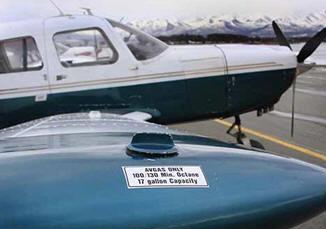|
|||||||||||||||||
|
|
|
|||
|
Aircraft AvGas Producers Face Charges In Lead Pollution By Mike Mitchell |
||||
 |
May 13, 2011 - The Center for Environmental Health (CEH) in Oakland Califoria announced it has initiated legal action against ExxonMobil, Chevron, BP, Shell, AvFuel Corporation and 38 airport-based suppliers of lead containing aviation fuel, for pollution of drinking water sources and/or air around twenty-five airports throughout California.
Under California law, pollution of drinking water
sources above state standards would require the
companies to cease sales of their leaded gas. ?The oil and aviation industries need to know Californians will not tolerate lead pollution that threatens our health and healthy environments,? said Michael Green, Executive Director of CEH. |
|||
|
?We expect the industries to take immediate action to eliminate pollution that endangers children and families who live, work and play near airports across the state.? The CEH legal action identifies 25 airports designated in a 2008 EPA report as those with the highest lead emissions in California. The legal action is directed against the fuel suppliers and companies that produce fuel sold at those airports. Among the airports with high levels of lead emitted from the use of aviation gas (avgas) are Los Angeles International (LAX), Oakland International, Orange County?s John Wayne Airport, Montgomery Field and Gillespie Field in San Diego, and others throughout the state.
Van Nuys Airport in LA County, also identified in the CEH
action, is listed by EPA as the airport with the country?s
highest lead emissions. Oakland, John Wayne and Long Beach?s
Daugherty Field are also listed by EPA as among the 12 airports
in the country with the highest lead emissions.
CEH contends that residents near the airports are exposed to
lead through air pollution from planes using leaded avgas, and
in the case of seven of the airports, through nearby drinking
water sources that are polluted by lead from avgas.
CEH has notified the oil companies that produce avgas used at the 25 airports and avgas suppliers at the seven airports with nearby drinking water sources that their sales of avgas are in violation of California?s Safe Drinking Water and Toxic Enforcement Act (known as Prop 65), which was established in 1986 to protect state residents from exposures to lead and other harmful chemicals. |
||||
|
Lead is an additive in avgas used in piston-engine aircraft, usually
small planes classified for general aviation or as air taxis. In 2008,
550 tons of lead were used in the making of avgas. While lead additives
are promoted to boost fuel octane, prevent engine knock, and improve
performance, lead also can impair engine functioning.
According to Flying Magazine, lead in avgas can cause spark plug
fouling, valve sticking, piston-ring land contamination and preignition
due to lead deposits on piston crowns. Further, alternative fuels
already exist. For example, ethanol-free premium auto gas is an
FAA-approved fuel available for more than 70 percent of current
aircraft. The FAA has determined that aircraft using auto gas are as
safe as those running on avgas.
The Environmental Protection Agency (EPA) has been considering lead
emissions from aviation gas since 2006, and the agency released its
advanced notice of rulemaking last year. According to EPA, in 2005
emissions from aircraft using leaded gas accounted for half of the
nation?s air emissions of lead, and the agency noted that lead emissions
from aviation fuel ?are also expected to distribute widely through the
environment.?
EPA listed drinking water as a source of human exposure to lead, and
also found that nationwide up to 16 million people reside and three
million children attend school in close proximity to airports where
leaded gas is used. Under Prop 65, residents near sources of high lead emissions must be notified of the potential for lead exposures, and emissions into drinking water above legal limits are banned. In 2008, CEH reached legal agreements under Prop 65 with Chrysler and the leading makers of automobile wheel balancing weights to end their use and sales of lead-containing wheel weights, which had been identified as a leading source of lead contamination of California drinking water. |
|
|
| ?AvStop
Online Magazine
Contact
Us
Return To News
|
|

